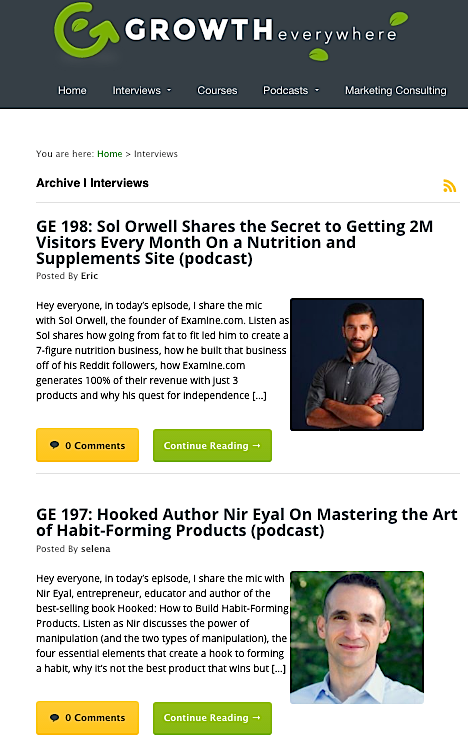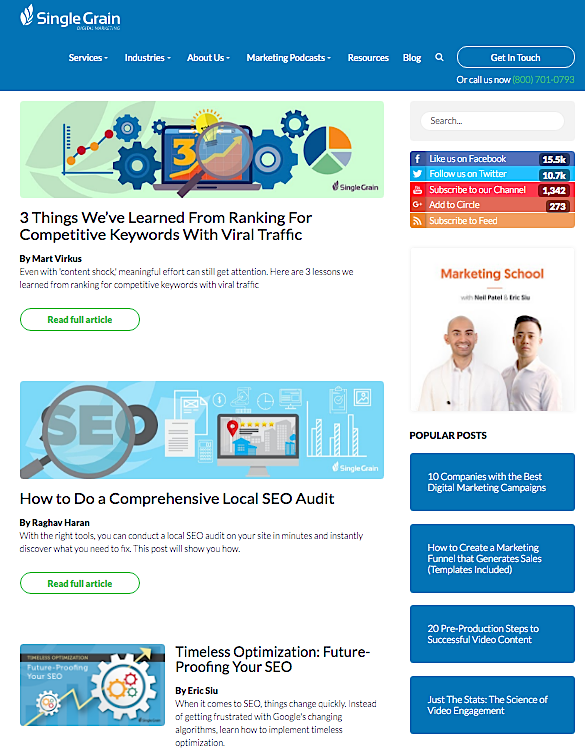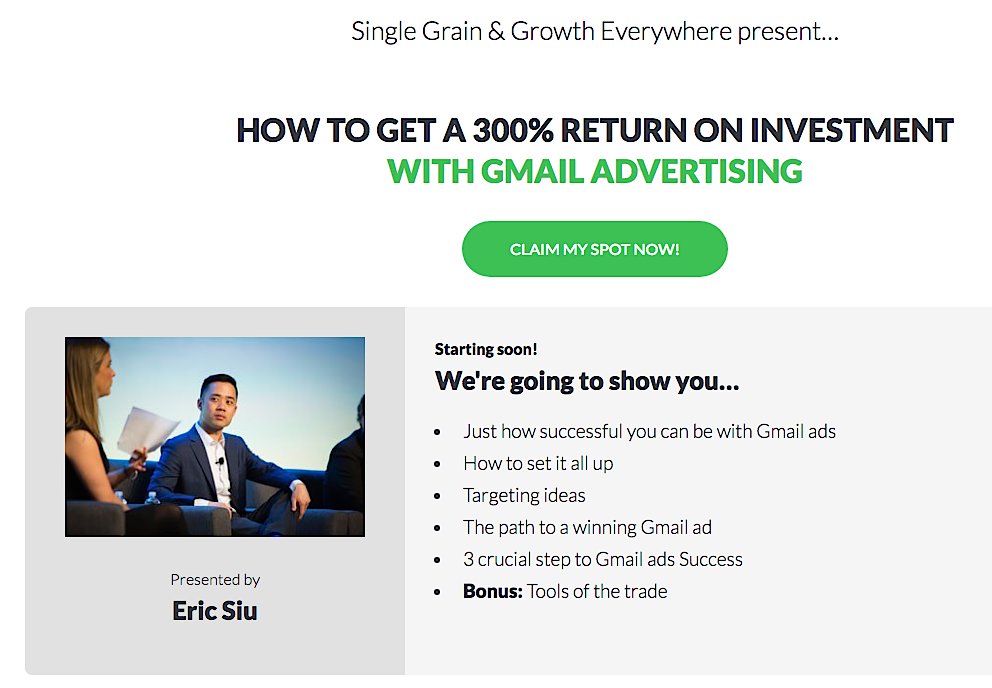Let’s talk about how you can market your consulting company.
There are a lot of people out there who are looking to get into freelancing or looking to start their own services business, and I think this is a great place to get started. In fact, I currently have one.
Blogging Is Brilliant for Organic Traffic
When it comes to marketing a consulting business, blogging helps tremendously. For B2B, it drives perhaps the best amount of organic traffic (that and guest posts in target sites). Obviously, blogging is a long-term game and the net positive effect compounds over time.
But blogging is far and away the best performer for us, and people still continue to link to the articles that we produce. In fact, the returns from that just keep getting better and better.
Blogging is an example of what I like to call “quantum marketing,” or marketing that builds up over time where the same input eventually leads to a larger and larger output. For example, advertising is a form of non-quantum marketing. Each month, you pay the same amount of money for a certain number of impressions or clicks. Blogging, on the other hand, has a snowball or quantum effect.
From a lead perspective, quantum marketing is also the number one lead generation channel that I’ve seen for any type of consulting or freelancing business.
When you create a blog, you'll find that it will generate more leads over time than anything else. Share on XLearn More: 7 Tips to Creating Killer Blog Posts that No One Else Is Writing
How to Market a Consulting Company When You’re New
In the short run, when you’re starting off you’re going to need to generate revenue. You won’t have an audience. You probably won’t even have a big social profile. So you’ll need to figure out how to generate income or get some clients as quickly as possible.
The tactic that I like using at the beginning is to find my ideal clients online. And that starts with figuring out how much you should be charging. Get out your Excel sheet and figure out your target revenue after all expenses and taxes. Then build out your hourly rate or project rates from there.
Once you’ve done that, it’s time to find those companies that can afford your rates. Personally, I like going after parent companies, because there are databases like Crunchbase that report all the new tech companies and their funding amounts. If someone has funding or they recently raised money, they’re much more likely to spend it because they’re flush with cash.

My strategy is to pick from the list of recently funded startups—but don’t go too big, because the bigger the company, the harder it is to get access to the right people. If someone raises a hundred million, that’s great for them but it will be hard for you to find the right budget stakeholder. If someone raises five million, they’re at a point where you can still easily get in touch with the owner or executive, and you can convince them to do something.
Once I find the companies in this sweet spot, ideally raising around $5-$10 million, I go through their website. If I’m pitching design services, I’ll create Photoshop mockups and tear apart what they’re doing wrong and how they can improve. If I’m targeting them for marketing services, I’ll take screenshots of all their pages and their source code (you can view source code in the browser), and show them what’s wrong from a marketing standpoint.
I outline it, I break it down for them, and then I shoot off the emails to as many people as possible within that organization. This includes the investors, because the investors are the board members on Crunchbase. These are the people who want to see the company succeed. If they succeed, they get a return on their money.
When you’re new, you should always go the extra mile, too. Since you don’t have any brand reputation to work with, putting in the extra effort really helps you stand out. For example, when I was building Single Grain back up, I would spend at least an hour creating a video for each startup I wanted to pitch.
This worked effectively, because few marketers are willing to do that.
Run Webinars
Let’s say you’re starting to roll, you’re starting to get some serious revenue in the door, and you can now afford paid advertising. This is when you should start thinking about webinars. There are a lot of people I know in the marketing funnel space right now who are just running paid traffic to webinars, and they’re doing great and generating highly qualified clients.
Related Content: Paid Content Promotion: A Comparison of the Different Platforms
Obviously, these should be informative webinars, not just ho-hum webinars. You need to generate interest, even create some hype (usually through an email campaign), draw them in, and then offer them a free consultation or free strategy session.
Create Free Tools
Another thing you can do is create a tool. Obviously, this requires even more budget and is something you do down the road. For example, you could create a tool like an SEO analyzer. It analyzes someone’s website and as they’re trying it out, you also ask them for their name, email address, budget, etc. before you show them the report.
This tactic works extremely well. Again, it requires a budget, but once you create the tool, you’ll get a ton of leads. A small portion of them (5% or so) will be qualified. But because you got so many leads to begin with, 5% is still a lot.
One thing Neil likes doing is associating himself with some of the biggest firms out there. For example, when he started out in the marketing niche, he wanted to do marketing consulting. So he hit up Mashable, TechCrunch, Gigaom, all the big blogs at the time, and he said, “I’m going to do your marketing for free.” He even hit up the popular personal bloggers like Guy Kawasaki and Brian Clark from Copyblogger.
Try Podcasting
Another thing that you can do is a podcast or videocast, like Growth Everywhere or Marketing School.

Again, you’d be doing something that most other agencies aren’t doing. So look around and see what opportunities are out there. Perhaps it’s Snapchat. Perhaps it’s Facebook Live.
Learn More: How to Leverage Facebook Live as a Marketing Tool
The longest-standing clients we have all came from the podcasts. We’ve had people say, “Hey, we’re spending $500,000 and I listen to your podcast. Would you like to work together?”
These leads are higher quality, because they know who you are as a person. They’ve listened to a ton of your episodes. So make sure your content is good in the first place. Believe it or not, you’re actually going to start generating great leads and you’re going to generate other opportunities as well.
You Can’t Scale Unless You Specialize
One of the fundamental problems with new businesses is that they don’t specialize. Because they need revenue and want more clients, they end up taking a one-size-fits-all approach. This is always a mistake.
As a rule, a generalist strategy is always harder to scale than a specialist strategy. Share on XNow, a good example of this in real life would be doctors or surgeons who specialize in a certain branch of medicine. They’re going to get paid a lot more than the doctors who are just generalists, like PCPs.
Is there a niche that you do well in? Or something that you like in particular? Try specializing in that. Not only will it make your life easier, it’s also going to be easier on your employees, too. They know how that industry works, and you don’t have to keep re-learning everything every single time you onboard a new client.
This post was adapted from Marketing School, a 10-minute daily podcast in which Neil Patel and Eric Siu teach you real-life marketing strategies and tactics from their own experience to help you find success in any marketing capacity.








